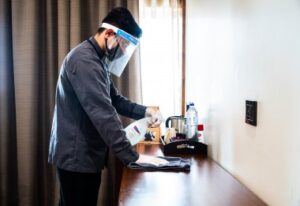Reopening Businesses – Potential Legal Consequences of Ignoring Sanitization
 As more and more people get vaccinated throughout the US, employers are looking to reopen businesses and worksites, and resume normal operations. However, the risk of COVID-19 hasn’t fully been mitigated. Without constant reliance on sanitization services, reopening presents several legal and practical challenges to consider.
As more and more people get vaccinated throughout the US, employers are looking to reopen businesses and worksites, and resume normal operations. However, the risk of COVID-19 hasn’t fully been mitigated. Without constant reliance on sanitization services, reopening presents several legal and practical challenges to consider.
Of course, the nature and intensity of these challenges will differ based on the industry, location, and conditions of the worksite, but one thing is clear; for now, the reopening strategy for every business must include sanitization service(s).
In this article, we will consider some of the potential legal and practical consequences of ignoring this need for sanitization, and what businesses must do to avoid these consequences.
Reopening Businesses – Ensuring Safety to Avoid Legal Liability
The most important factor for employers when it comes to ensuring the successful reopening of businesses is crafting a safe legal strategy that complies with all the legal and practical requirements set by employee safety laws (federal, state, and local).
The biggest problem businesses face here is that these minimum requirements keep on changing as newer COVID variants and mutations keep coming up. Employers (or their dedicated sanitization service and lawyer) must check these requirement updates regularly if reopening the workplace.
At the same time, the number of people resigning while working from home is also increasing as people turn towards freelancing more; this is known as the Great Resignation. To mitigate the potentially disastrous impacts of this, employers have no option but to call employees back.
Reputable sanitization services are also keeping an eye on rules, regulations, and laws to help clients avoid practical and legal liability(s). Core things to consider include:
- State/local directives, orders, and ordinances
- OSHA and CDC safety requirements, which specifically include that the workplace should be sanitized regularly.
- The increased standard of employee care, which would mean increased costs.
Sanitization services in Big Rapids/Fermont will differ from sanitization services in other areas, which is why employers are encouraged to develop a strategy for differing requirements.
In the early business reopening stages, businesses can avoid legal and practical liability by:
- Screening employees and customers before they enter the worksite
- Sanitize employees and 3rd parties before they come into contact with others on your worksite
- Identify symptoms immediately and ask the employee to work from home immediately
- Adhere to Social distancing requirements (extremely important, This includes:
- Minimizing group meetings
- Limiting the use of common areas
- Staggered shifts
- Staggered meal time or breaks
- Flexible hours for employees
- Allow breaks to employees
- Provide face masks and sanitizers to employees
- Create physical barriers between employees sitting near each other
- Asking employees not to share foodstuffs or equipment
- Encourage sick leaves
- Minimize travel
- Enforce good hygiene and respiratory etiquette at the workplace by
- Offering tissues
- Offering sanitizers
- Allowing employees time to constantly wash their hands
- Conducting cleanliness checks/inspections regularly
- Allow sanitization services to clean desks and the workplace as a whole regularly
Dealing with Infected Employees
Infected employees may be a source of liability for the employer, especially if the employee or their family are willing to sue for ignoring sanitization and COVID-related safety rules. The best way to deal with an infected employee is to remain prepared at all times and to let employees know that you have a plan.
This plan should include:
- Sending symptomatic/infected employees home
- Identifying potential sources of infections
- Inform others who came into contact with the infected individual without revealing the infected person’s identity.
- Getting the entire workplace or facility sanitized, as recommended by the CDC, or closing off the relevant area. The decision should be made by or with a health official, though.
If another employee gets infected and steps weren’t taken to ensure that no other employees get infected (such as informing, sanitizing, etc.), employees have the right to sue and claim damages. However, if others get infected, and you have taken the necessary steps as mentioned above, you won’t have to bear any legal consequences as you acted in ‘good faith.’
It is important to note here that employees have the right to refuse screening for COVID-19. If they do so, several employer rights can be exercised as well. For example, you will then have the ability to deny the employee entrance to the worksite. However, this is only applicable if you have already taken the necessary acts to keep your workplace safe, especially the sanitization service.
However, if the screening test is denied because of a disability or religion, the employee can discuss options with the employee and a reasonable accommodation can be found. There will be no legal ramifications for you if you follow the proper procedure here, but the same cannot be said if you ignore satiation services.
Many legal and practical liabilities can arise after reopening businesses, most of which can be avoided with timely action and regular sanitization of the workplace. 911 Restoration Sanitization Services of Fermont and Big Rapids can help you avoid these consequences and stay up to date with any new rules and regulations of opening the workplace. Give us a call, and let us help you formulate a strategy for FREE!


